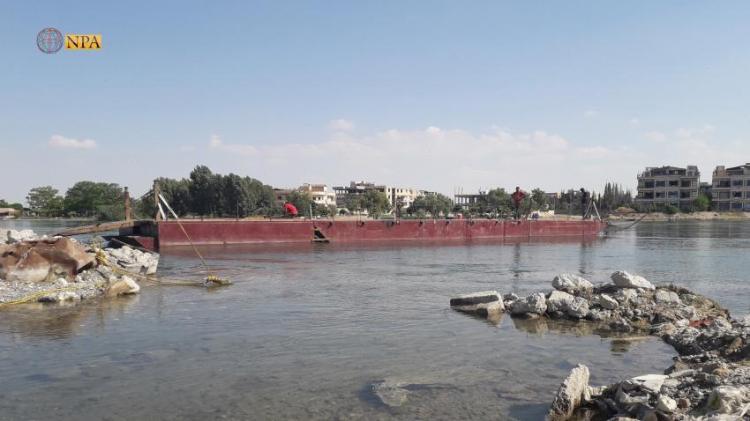Raqqa – North-Press Agency
Ahmad AlHassan / Abdulrahman Al-Jasim
The Raqqa Civil Council rehabilitated the old Raqqa Bridge, which was opened on 20 April this year, as the problem of crossing the Euphrates river by ferries ended to be replaced with another problem, which was interrupting the income of ferries’ owners, the matter that made them looking for new jobs.
Earlier, Raqqa bridges on the Euphrates River, northeast of Syria, was destroyed due to the heavy battles against Islamic State group, to isolate the latter from supply lines, the southern countryside of Raqqa was separated from the city center which was, in turn, separated from the rest of the Syrian cities, what prompted the owners of economic and industrial establishments to find a way for transporting their goods and products, to come up with the phenomenon of ferries.
The Ferries
Large ships that are used to transport heavy and light vehicles, as well as transporting people to work or to meet their needs between the two banks of the river.
It has been working on the Euphrates River since 2017 until the 20th of April, the date the old bridge started operating, as over 25 ferries of various sizes and purposes were an emergency solution that helped to connect between the southern countryside and the city.
The work has stopped
After the opening of the Old Bridge, which was rehabilitated by Raqqa Civil Council, the problem of crossing the river was over; however, it affected some of the ferries’ owners and their families as their income interrupted; as ferries were no longer needed.
Khalid al-Kuwaiti, a ferry owner told North-Press about their situation by saying; “After the opening of the bridge, the ferries stopped working, we have nothing to do now, we are more than six families, we relied on ferries as a source for our income.”
Alternatives
Hence, this led ferries’ owners to search for alternatives to earn their living, as some of them worked in other fields such as construction, trade and others.
Muhammad al-Ghazi, an owner of a ferry on the Euphrates River, told North-Press, “After the work has stopped, I bought a pickup truck and now I’m working in moving construction materials.”
While others insisted on working in the same field after they took their ferries to work in the city of Deir Ez-Zour, east of the country, where it still suffers the problem of mobility between the two banks of the river.
Bridge load capacity
As heavy trucks were not allowed to pass on the bridge, Khalid al-Kuwaiti took advantage of bridge’s incapability of carrying heavy weights, to be an opportunity to develop his ferry to bring it into operation.
“We are working on building a huge ferry with a length of 25 meters and a load capacity of more than 50 tons to transport heavy trucks,” he said.
Ferries’ owners are still trying to adapt and looking for alternatives after they have stopped a work, they have been accustomed to for the past two years.

